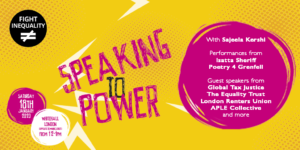Our money and banking system is driving inequality

This year’s Fat Cat Day – the day in the year when an average FTSE 100 CEO earns just as much as the typical employee does in a whole year – was Monday 6th January. Meaning it took just three working days for CEOs to make the median British salary of £29,559.
This gulf grows even wider when we look internationally. Last year Oxfam found 26 people own the same amount of wealth as the 3.8 billion who make up the poorest half of our planet’s population. And when Oxfam updates that statistic on Monday, the number will probably be even smaller.
Below the surface of these snapshot statistics lies a broken system. A system which not only embeds, but perpetuates the divide between the rich and the rest of us. A system which means no matter how much we may try and redistribute resources in our economy these inequalities will keep coming back – it’s our broken money and banking system.
Firstly, it’s a problem with how money is created in the first place. Right now almost all the money in our economy is created by private banks when they make loans. Most people think when banks make loans they’re lending out someone else’s savings – but they’re not. Instead when somebody takes out a loan, banks create new money electronically by typing numbers into customer’s accounts. This means the more loans people take out, the more money there is in our economy, but equally the more debt there is too.
This debt-based money system means that somebody somewhere is paying interest on every pound in your pocket. And because most debt is held by the bottom ninety percent of the population, and wealth mostly by the top ten percent, paying interest transfers money from the bottom to the very top. This system sucks wealth and money from the rest of us up to a lucky few. And as long as we continue paying this huge interest bill, the gap between the richest and the rest of us will keep increasing.
Another huge case of inequality in our country is housing; our broken money and banking system is contributing to this as well.
Whilst many people assume that the price of housing is a result of supply and demand (ie. house prices are high because lots of people need one but there are not enough to go around) this is not true and building more homes won’t help. Instead, researchers at the Bank of England found last year that “relative scarcity of housing played almost no role” in rocketing prices. Rather they identified the role of historically low interest rates as the key in driving up house prices – and the rise has been striking. In 1997, the average house price was 3.6 times the average salary, in just twenty years this had more than doubled to nearly 8 times.
Low interest rates increase the value of future income from an asset and therefore increases the amount people are willing to pay to own it now. This means borrowers are incentivised to take on more mortgage debt in the hopes of becoming wealthier in the future. This encourages people to take out mortgages to buy houses they might not need, but who are simply looking for a good investment. Researchers therefore conclude that low interest rates, which have been on a downward trajectory since the early 1990s, account “for almost all real house price rises since 2000.” And since over half of new money in the UK is going towards mortgage lending, it’s no surprise house prices have ballooned out of step with the rest of the economy.
Those are just two examples of how our broken money and banking system is driving inequality. It’s clear we need radical change, and fast.
Next week the world’s elite will flock to the exclusive Swiss ski resort of Davos for the World Economic Forum. Hundreds of politicians and business leaders will meet to discuss the world’s biggest challenges, and inequality will be high on their agenda. But how can we expect the very people who have created and benefitted from this broken system to come up with the radical ideas we need to fix it?
So, while the world’s 1% meet to engage in more hollow talk, we’re taking to the streets of Westminster this Saturday afternoon for Speaking to Power: the global protest to #FightInequality. We’ll be calling for radical action to challenge the inequalities we face, and to prove that real solutions to inequality will not come from the world’s elite – but from us.
The hour-long rally will include a mix of speeches and musical performances highlighting the negative impact of inequality and peak with ‘minute of mayhem’ to symbolise our outrage and demonstrate just how powerful we can be when we all speak with one voice. So, bring along your bells and whistles, pots and pans and musical instruments (or just your own voice!) and help us make some noise this Saturday!
